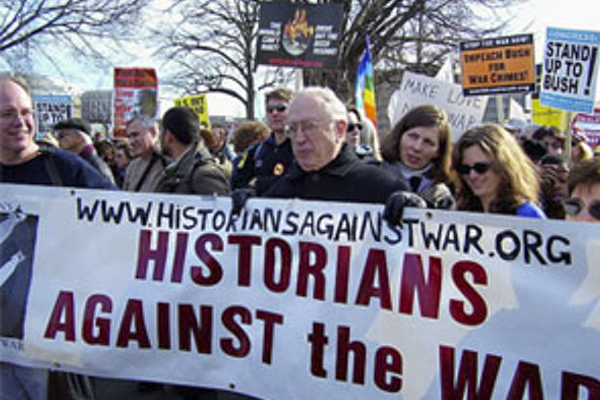Historians for Peace and Democracy Present Free Resources for History Educators

Historians for Peace and Democracy (H-PAD) is a national organization of progressive historians. As part of our mission to foster education on campuses and in communities, encourage activism, and facilitate networking with organizations that work for peace and justice, we are making a series of new resources available for use. They are totally free, so they fit your budget! These resources include a Virtual Speakers Bureau, short videos in the Liberating History series, and a syllabus on sanctions.
H-PAD launched its Virtual Speakers Bureau in March 2021. Forty outstanding professional historians, activists, and independent scholars have volunteered to speak to classes, campuses, community-based groups, and other organizations. No honorarium is required or expected, just a mutually-agreed-upon date, time, and topic. The presentations can be tailored to meet both parties’ interests, expertise, convenience, and needs. H-PAD has organized speakers bureaus in the past, but the current widespread use of video conferencing technology allows us to extend the invitation beyond our own locales to include organizations across the United States and around the world. If you would like to learn about the speakers and how to invite them, please click here.
The new Sanctions Syllabus was developed by Renate Bridenthal, Molly Nolan, and Prasannan Parthasarathi, three members of the H-PAD Empire Working Group. It dissects “economic sanctions – their forms, legality, and effectiveness, their history across the twentieth century and their current deployment, as well as blowback from and resistance to them.” The syllabus offers definitions, examples, and links to a wealth of articles, books, and films. It examines the use and impact of sanctions against Cuba, Venezuela, Iraq, Iran, Russia, China, apartheid South Africa, and Israel, with a particular discussion of the Boycott, Divest, and Sanctions (BDS) campaign. To access the syllabus, click here.
We’ve recently expanded into video and audio production, too. Our Liberating History series features lightning video lectures of 3-4 minutes. In “Black Panthers Against Patriarchy,” Robyn Spencer discusses why so many Black women saw the Black Panther Party as a place of feminist empowerment. In another new episode, Prasannan Parthasarathi puts “India’s Far Right in Historical Perspective,” explaining its origins in the country’s caste system and the ideology of Hindu nationalism. And be sure to check out our earlier Liberating History episodes as well: Irene Gendzier on the roots of Trump’s Middle East policy, Donna Murch on crack and mass incarceration, and Ellen Schrecker on McCarthyism past and present.
We encourage you to use, and share, these resources. At H-PAD we believe in using history to empower people to confront systems of hierarchy and oppression. If you’d like to collaborate in making that happen, please join us!